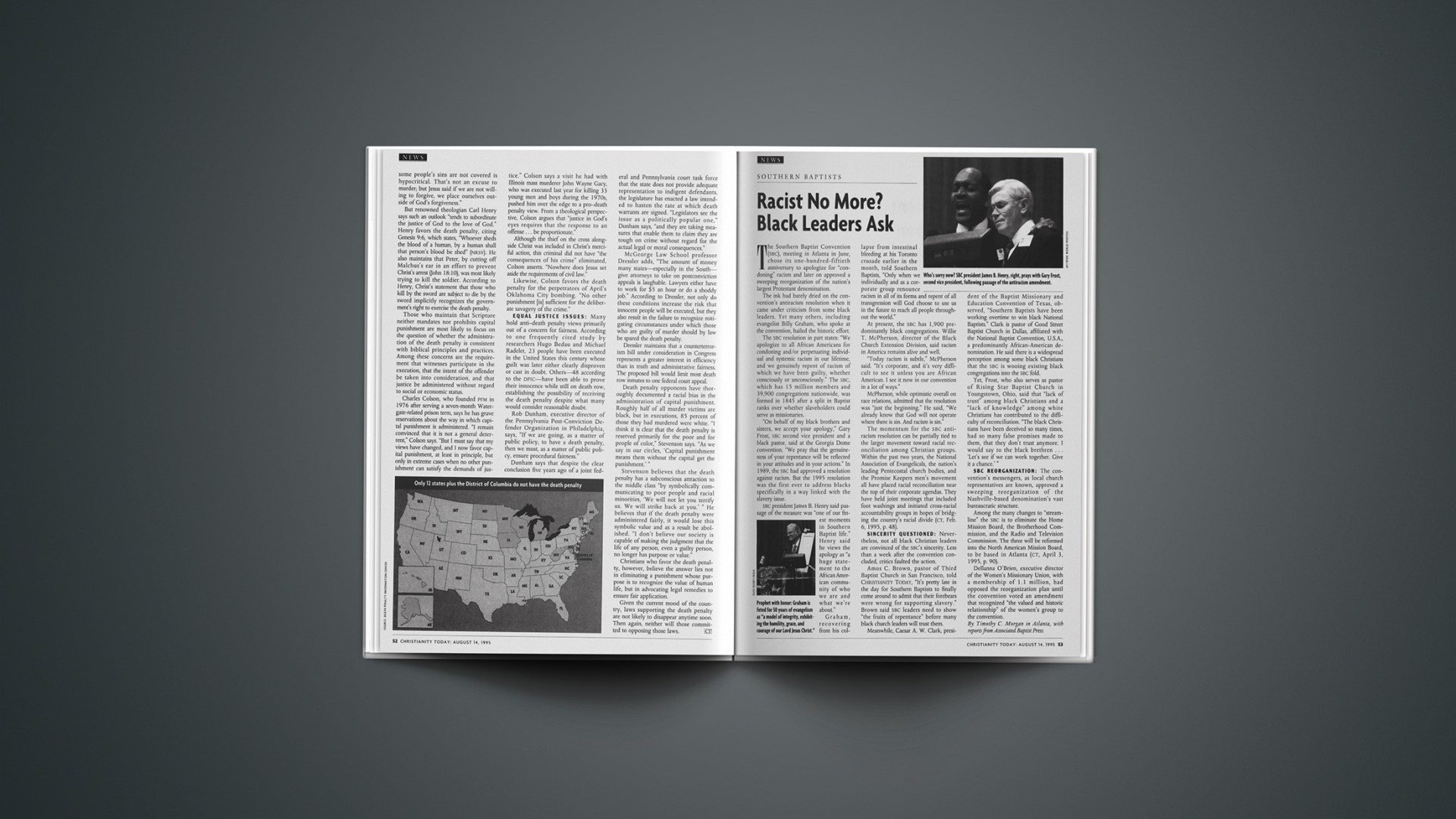The Southern Baptist Convention (sbc), meeting in Atlanta in June, chose its one-hundred-fiftieth anniversary to apologize for “condoning” racism and later on approved a sweeping reorganization of the nation’s largest Protestant denomination.
The ink had barely dried on the convention’s antiracism resolution when it came under criticism from some black leaders. Yet many others, including evangelist Billy Graham, who spoke at the convention, hailed the historic effort.
The sbc resolution in part states: “We apologize to all African Americans for condoning and/or perpetuating individual and systemic racism in our lifetime, and we genuinely repent of racism of which we have been guilty, whether consciously or unconsciously.” The sbc, which has 15 million members and 39,900 congregations nationwide, was formed in 1845 after a split in Baptist ranks over whether slaveholders could serve as missionaries.
“On behalf of my black brothers and sisters, we accept your apology,” Gary Frost, sbc second vice president and a black pastor, said at the Georgia Dome convention. “We pray that the genuineness of your repentance will be reflected in your attitudes and in your actions.” In 1989, the sbc had approved a resolution against racism. But the 1995 resolution was the first ever to address blacks specifically in a way linked with the slavery issue.
sbc president James B. Henry said passage of the measure was “one of our finest moments in Southern Baptist life.” Henry said he views the apology as “a huge statement to the African American community of who we are and what we’re about.”
Graham, recovering from his collapse from intestinal bleeding at his Toronto crusade earlier in the month, told Southern Baptists, “Only when we individually and as a corporate group renounce racism in all of its forms and repent of all transgression will God choose to use us in the future to reach all people throughout the world.”
At present, the sbc has 1,900 predominantly black congregations. Willie T. McPherson, director of the Black Church Extension Division, said racism in America remains alive and well.
“Today racism is subtle,” McPherson said. “It’s corporate, and it’s very difficult to see it unless you are African American. I see it now in our convention in a lot of ways.”
McPherson, while optimistic overall on race relations, admitted that the resolution was “just the beginning.” He said, “We already know that God will not operate where there is sin. And racism is sin.”
The momentum for the sbc antiracism resolution can be partially tied to the larger movement toward racial reconciliation among Christian groups. Within the past two years, the National Association of Evangelicals, the nation’s leading Pentecostal church bodies, and the Promise Keepers men’s movement all have placed racial reconciliation near the top of their corporate agendas. They have held joint meetings that included foot washings and initiated cross-racial accountability groups in hopes of bridging the country’s racial divide (ct, Feb. 6, 1995, p. 48).
SINCERITY QUESTIONED: Nevertheless, not all black Christian leaders are convinced of the sbc’s sincerity. Less than a week after the convention concluded, critics faulted the action.
Amos C. Brown, pastor of Third Baptist Church in San Francisco, told Christianity Today, “It’s pretty late in the day for Southern Baptists to finally come around to admit that their forebears were wrong for supporting slavery.” Brown said sbc leaders need to show “the fruits of repentance” before many black church leaders will trust them.
Meanwhile, Caesar A. W. Clark, president of the Baptist Missionary and Education Convention of Texas, observed, “Southern Baptists have been working overtime to win black National Baptists.” Clark is pastor of Good Street Baptist Church in Dallas, affiliated with the National Baptist Convention, U.S.A., a predominantly African-American denomination. He said there is a widespread perception among some black Christians that the sbc is wooing existing black congregations into the sbc fold.
Yet, Frost, who also serves as pastor of Rising Star Baptist Church in Youngstown, Ohio, said that “lack of trust” among black Christians and a “lack of knowledge” among white Christians has contributed to the difficulty of reconciliation. “The black Christians have been deceived so many times, had so many false promises made to them, that they don’t trust anymore. I would say to the black brethren . . . ‘Let’s see if we can work together. Give it a chance.’ “
SBC REORGANIZATION: The convention’s messengers, as local church representatives are known, approved a sweeping reorganization of the Nashville-based denomination’s vast bureaucratic structure.
Among the many changes to “streamline” the sbc is to eliminate the Home Mission Board, the Brotherhood Commission, and the Radio and Television Commission. The three will be reformed into the North American Mission Board, to be based in Atlanta (ct, April 3, 1995, p. 90).
Dellanna O’Brien, executive director of the Women’s Missionary Union, with a membership of 1.1 million, had opposed the reorganization plan until the convention voted an amendment that recognized “the valued and historic relationship” of the women’s group to the convention.
By Timothy C. Morgan in Atlanta, with reports from Associated Baptist Press.
Copyright © 1995 Christianity Today. Click for reprint information.
ctcurrtk5T90535814










